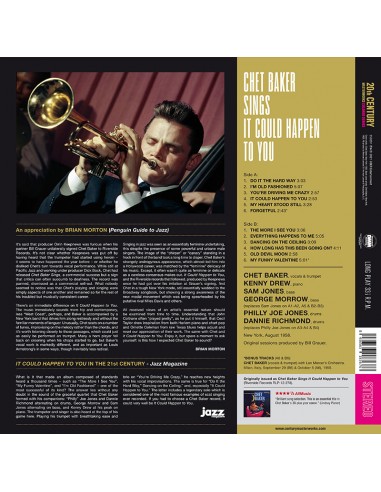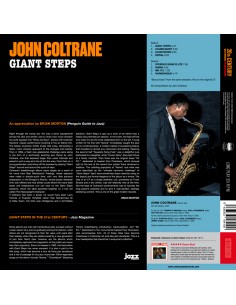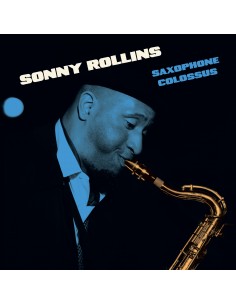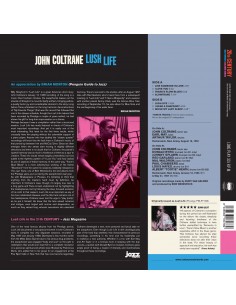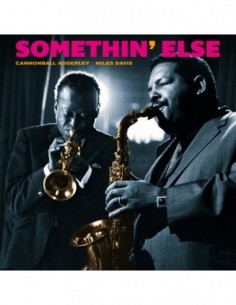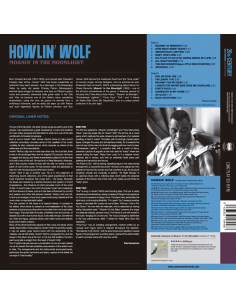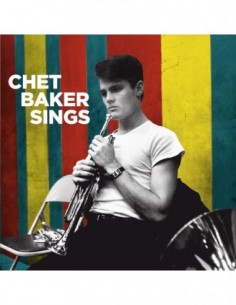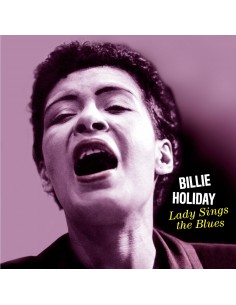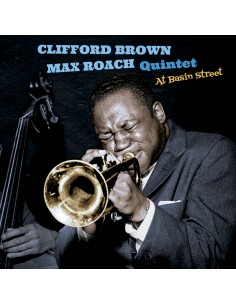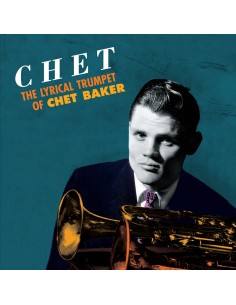Sings It Could Happen to You (Colored Vinyl)
Chet BakerLIMITED EDITION
LONG PLAY 33 1/3 R.P.M.
INCLUDES 2 BONUS TRACK
INCLUDES NEW SPECIALLY PREPARED LINER NOTES BY PENGUIN GUIDE TO JAZZ'S WRITER BRIAN MORTON AND BY PARIS'S PRESTIGIOUS JAZZ MAGAZINE
“The music immediately sounds more hip and contemporary, less “West Coast”, perhaps, and Baker is accompanied by a New York band that drives him along restlessly and without the familiar moments of languor.” - PENGUIN GUIDE TO JAZZ
“If you had to choose a Chet Baker record, it could very well be It Could Happen to You.” - JAZZ MAGAZINE
PERSONNEL:
Chet Baker - vocals & trumpet
Kenny Drew - piano
Sam Jones - bass
George Morrow - bass on A1-A2, A5 & B2-B3
Philly Jo Jones drums
Dannie Richmond - drums on A3-A4 & B4
New York, August 1958
(*) BONUS TRACKS (A6 & B6):
Chet Baker (vocals & trumpet) with Len Mercer’s Orchestra.
Milan, Italy, September 29 (B6) & October 5 (A6), 1959.
TRACKS:
SIDE A:
A1. DO IT THE HARD WAY
A2. I’M OLD FASHIONED
A3. YOU’RE DRIVING ME CRAZY
A4. IT COULD HAPPEN TO YOU
A5. MY HEART STOOD STILL
A6. FORGETFUL (*)
SIDE B:
B1. THE MORE I SEE YOU
B2. EVERYTHING HAPPENS TO ME
B3. DANCING ON THE CEILING
B4. HOW LONG HAS THIS BEEN GOING ON?
B5. OLD DEVIL MOON
B6. MY FUNNY VALENTINE (*)
- Format
- LP
- Discs
- 1
- Label code
- 350231

Chet Baker
The sad angel of jazz, the James Dean of Jazz, the monster or the white Miles Davis, as Chet Baker is often called, seem like epithets used by the ancient Greeks to define the qualities of their gods and heroes.
And the fact is that the life of this American trumpeter, singer and musician was epic: the gods gave this man unique talents, but also a life experience that struggled between shadows, addictions and torments.
The music that Chet Baker made is an authentic and inescapable sample of the best style of jazz called cool, or also known as the west coast jazz of the first half of the last century. For jazz lovers, Baker is one of the most important exponents of both the style and the genre: a singular, intimate voice, with soft and plaintive melodies, which undoubtedly captivates anyone. His life and legacy, for any jazz collection, deserve to be on the podium.
BIOGRAPHY
Chet Baker had a real name: Chesney Henry Baker Jr. He was born in Yale (Oklahoma) on December 23, 1929 and died under strange circumstances in Amsterdam (Netherlands) on May 13, 1988. His childhood was fleeting and without too many grandiloquences: a mother who worked in a perfumery and a father fond of the guitar who initiated him in the trombone, although he ended up buying him a trumpet because the trombone was too big for him.
The musical beginnings of the sad angel of jazz go back to the singing contests in which he participated in school and church choirs. After military service and playing in the 298th Army Band in Berlin, Chet Baker returned to the United States and enrolled at El Camino College in Los Angeles. There he studied harmony and music theory, although he later withdrew from this institute for not meeting some of his expectations. After re-enlisting in the army, where he participated in the Sixth Army Band in San Francisco, Chet Baker devoted himself exclusively to jazz.
Like the vast majority of jazzmen of the time, Baker's career was made on the basis of performances in bars and jazz clubs. His leap to fame and immediate recognition came when he took part in a trumpet audition for the legendary Charlie Parker, who, without hesitation, hired him as a sideman. Touring with Parker, this was the time when not only his musical abilities and influences, but also his addictions, took hold, and in which he also had the opportunity to share experiences with legendary musicians such as Stan Getz and Gerry Mulligan.
MUSICAL INFLUENCES
It is sometimes difficult to build a musical legacy in an era where talent seems to be produced in industrial quantities. But being born and developing in the midst of talents like Charlie Parker, Gerry Mulligan, or in the wake of Miles Davis or Ella Fitzgerald, did not backfire on Chet Baker: he built his musical destiny in his own style, without being obscured by the brilliance of many of those who collaborated with him.
Baker's main musical influence was to have brought cool jazz into his own territory. His lyrical talent and mastery of the trumpet, which was able to say in a chord what others said with words, opened him to the public and configured around jazz a way of living and feeling the music with his own stamp.
DISCOGRAPHY
Chet Baker died on May 13, 1988. He fell from a window (or was thrown, as some suspect) from a hotel in Amsterdam, but he left behind a musical record of luxury. Let's take a look at a selection of that recording legacy:
1952 Live at the Trade Winds
1953 West Coast Live
1953 Witch Doctor
1953 Chet Baker Sings
1953 Compositions and Arrangements by Jack...
1953 Grey December
1953 Chet Baker and Strings
1953 Chet Baker with Strings
1953 The Other Pianoless Quartet, Haig 1953
1954 Young Chet
1954 Boston
1954 Jazz at Ann Arbor
1954 The Trumpet Artistry Of
1954 Chet Baker Sextet
1954 Chet Baker Big Band
1954 My Funny Valentine
1955 Chet Baker Sings and Plays from the "Let's...
1955 Chet Baker Sings and Plays with Bud Shank,...
1955 In Europe 1955
1956 Quartet: Russ Freeman/Chet Baker
1956 Chet Baker & Crew
1956 The Route
1956 At the Forum Theater
1956 Chet Baker Cools Out
1956 Playboys
1956 Chet Baker in Europe
1956 Live in Europe 1956
1956 Chet Baker Sings
MOST FAMOUS SONG
Although numerous artists (over 600 to be exact) have covered Rodgers and Hart's My Funny Valentine, no one has dared to do it quite like Chet Baker. It may seem an exaggeration, but it can be said that this song would not be the same without Chet Baker. It is undoubtedly followed by Chet Baker - Let's get lost or Chet Baker Singing, songs that are still listened to because of the mark they left on jazz fans.
Among other important songs we can also highlight: But Not For Me - (Chet Baker Sings - Chet Baker); or one of his most intimate and sentimental songs, Why Shouldn't I? Here the trumpet, the strings and the tenor saxophone, move, bring closer and warm any audience.
Finally, Chetty's Lullaby and Almost Blue are mentioned, two songs that can be called biographical in the sense of Chet's relationship, life and work: the kind of life he led with the kind of music he managed to produce while he was alive.
 Cookie preferences
Cookie preferences


